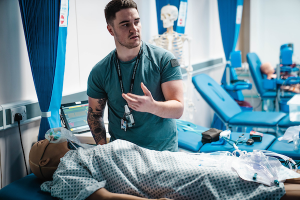
University of Bolton, Deane Road, Bolton. BL3 5AB
Tel:
Email:


“At the University of Bolton, we take great pride in providing a quality, supportive learning environment for our students.”
Professor George E Holmes DL | President & Vice Chancellor
“...tutors are very supportive and you’re not just a student ID number, at this university you are an individual with a name.”
Ellisse Vernon | BSc (Hons) Adult Nursing
Back to menu
Back to menu
Study with an Off-Campus Partner
Back to menu
Back to menu
University of Bolton, why we are the right choice
Location - Bolton, Greater Manchester

27/04/2023
The demand for nurses to help treat Parkinson’s disease is growing a projected 172,000 people expected to receive a diagnosis by 2030. So, if you’re interested in making a difference to the patient care in the UK, we’ll explain what Parkinson’s disease is. We’ll look at what causes it and how to treat it, as well as how a nursing degree can help you enter this rewarding career.
What is Parkinson’s Disease?
Many consider Parkinson’s Disease to be like dementia in the way it affects the human brain. Parkinson’s is a condition that gets progressively worse over the years, causing severe memory loss, and other physical and psychological symptoms, like:
- Anxiety and depression
- Balance problems
- Loss of smell
- Sleeping issues
Now, you might be wondering what causes Parkinson’s Disease? One contributing factor is a loss of nerve cells in a part of the brain that doctors call the substantia nigra. This leads to a reduction in a chemical called dopamine, which is responsible for regulating the body’s movement. And this is what is responsible for many of the symptoms of Parkinson’s Disease. Although, what causes a loss of nerve cells remains unclear, what we do know is the demographic of people in which Parkinson’s is most common. Usually, people start developing symptoms after 50 years old.
How to Treat Parkinson’s Disease
As there is no definitive cure for Parkinson’s, patients need access to effective treatment. Without eradicating the disease, these treatments aim to reduce symptoms and maintain the patient’s quality of life for as long as possible. Treatments can include:
- Physiotherapy and occupational therapy
- Medication, e.g., tablets
- In some cases, brain surgery
Although you might not need treatment at the early diagnosis stage, catching the condition early is vital. This will allow GPs to determine the right treatment plan and increase the patient’s survival chances and life expectancy. Subsequently, regular medical appointments are essential to monitor the status of the condition and determine if the treatment plan needs to be altered.

Why Study a Nursing Degree
Want to join a remarkable healthcare field?
The adult nursing degrees at the University of Bolton could be an ideal solution to help you learn how to make your mark at the heart of the caring industry. We offer courses in partnership with multiple local NHS Trusts:
- BSc (Hons) Nursing (Adults) [Bolton NHS Foundation Trust]
- BSc (Hons) Nursing (Adults) [Manchester University NHS Foundation Trust]
- BSc (Hons) Nursing (Adults) [Bradford Satellite Nursing Centre]
- BSc (Hons) Nursing (Adults) [Lancashire Teaching Hospitals NHS Foundation Trust]
- BSc (Hons) Nursing (Adults) [Petroc College Satellite Nursing Centre]
These courses have not only been voted first for Student Satisfaction, but they are also accredited by professional bodies such as the Nursing and Midwifery Council, the Health and Care Professions Council, and the General Pharmaceutical Council. This means that our students graduate with a degree that is going to be valued by industry employers.
Plus, while students are with us, we aim to provide them with a positive and supportive learning environment. We prepare them for the real-world by teaching them in spaces that mimic an industry environment. This includes the university’s four Clinical Simulation Suites located in the state-of-the-art £31 million Bolton One building. It’s just one way we’re giving students the practical experience they need to succeed.
Upon completion of your studies, you will have the qualification you need to apply for a Band Five nursing post at the partner NHS Trust you received your degree with. For example, if you take the BSc (Hons) Nursing (Adults) [Manchester University NHS Foundation Trust] course, then you can apply for a band five position with Manchester University NHS Foundation Trust right after graduation.
Want to find out more? Click here to view the full nursing and midwifery course details.
For more information, please contact us at enquiries@bolton.ac.uk or call us on 10204 903903.
#UseYerLoaf… and choose #UniAsItShouldBe; where you come first, always!
*Complete University Guide – Student Satisfaction – Greater Manchester - 2023